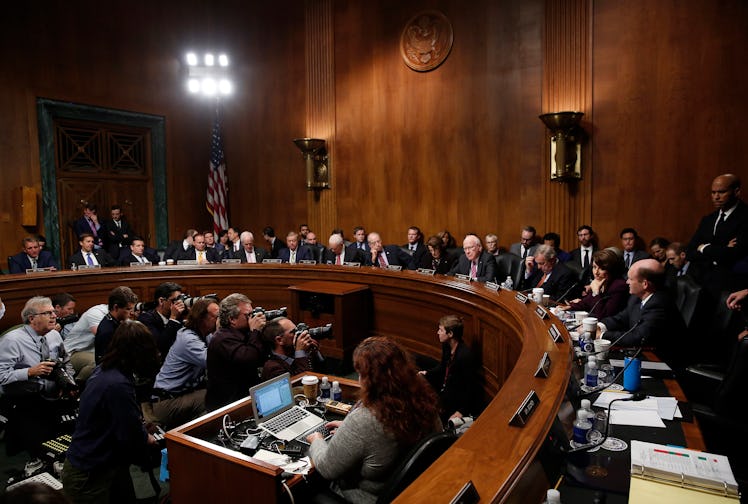
Here's What A Procedural Vote Really Means In The Senate, If You Were Wondering
Brett Kavanaugh's journey to the Supreme Court has been rife with controversy, but regardless of the rocky road, there's a procedural vote scheduled to happen Friday, Oct. 5. If you've been keeping an eye on the proceedings, then you might be wondering — what's a procedural vote in the Senate? Well, there's some good news: It's not the final say.
When it comes time for the Senate Judiciary Committee to sit down and carry out a procedural vote on Friday, they'll only be voting on whether or not to proceed with the vote — they will not be confirming him as a justice of the Supreme Court, according to The New York Times. All the motion needs to pass is 51 votes, which is a simple majority. If it passes, then it goes to the final step, which is called an up-or-down vote.
According to USA Today, during an up-or-down vote, senators are given up to 30 hours, divided between Republicans and Democrats, to debate over Kavanaugh's nomination. The cap is 30 hours, but senators can choose not to use all of their time. Once the 30-hour limit is up, the Senate takes one final vote on whether or not to confirm Kavanaugh to the Supreme Court. Once again, only a simple majority of 51 votes is needed to send Kavanaugh straight to the SCOTUS bench. As it stands, the Republicans have that majority at 51 seats. Since the procedural vote is taking place on Friday, Oct. 5, there could be a decision on Kavanaugh as early as Saturday, Oct. 6.
The procedural vote comes on the heels of the Senate receiving the report from the FBI on the investigation into the sexual assault claims against Kavanaugh, which he has denied, saying the allegations are "completely false." Elite Daily reached out to Kavanaugh's team for further comment but did not hear back. The White House was first to receive the FBI report on Wednesday, Oct. 3, and didn't find any evidence against Kavanaugh. White House Spokesperson Raj Shah said in a tweet on Thursday, Oct. 4, that the FBI conducted a "comprehensive" investigation and the White House is "fully confident" the Senate will vote to confirm Kavanaugh. Elite Daily reached out to the White House for further comment on the report, but did not immediately hear back. Shah wrote in his tweet,
This is the last addition to the most comprehensive review of a Supreme Court nominee in history, which includes extensive hearings, multiple committee interviews, over 1,200 questions for the record and over a half million pages of documents. With this additional information, the White House is fully confident the Senate will vote to confirm Judge Kavanaugh to the Supreme Court.
The White House didn't find any evidence to corroborate the claims against Kavanaugh, and when Judiciary Committee Chairman Chuck Grassley was given a briefing on the report, he came to the same conclusion, according to The Hill. In a Thursday statement, Grassley said of the report, "There's nothing in it that we didn't already know." He then added that there's no "contemporaneous evidence" for the "uncorroborated accusations" against Kavanaugh. Grassley said,
I’ve now received a committee staff briefing on the FBI’s supplement to Judge Kavanaugh’s background investigation file. There’s nothing in it that we didn’t already know. These uncorroborated accusations have been unequivocally and repeatedly rejected by Judge Kavanaugh, and neither the Judiciary Committee nor the FBI could locate any third parties who can attest to any of the allegations. There’s also no contemporaneous evidence.
The situation isn't looking too good for those who don't want to see Kavanaugh take a seat on the SCOTUS bench, but there's still some time for things to turn around.